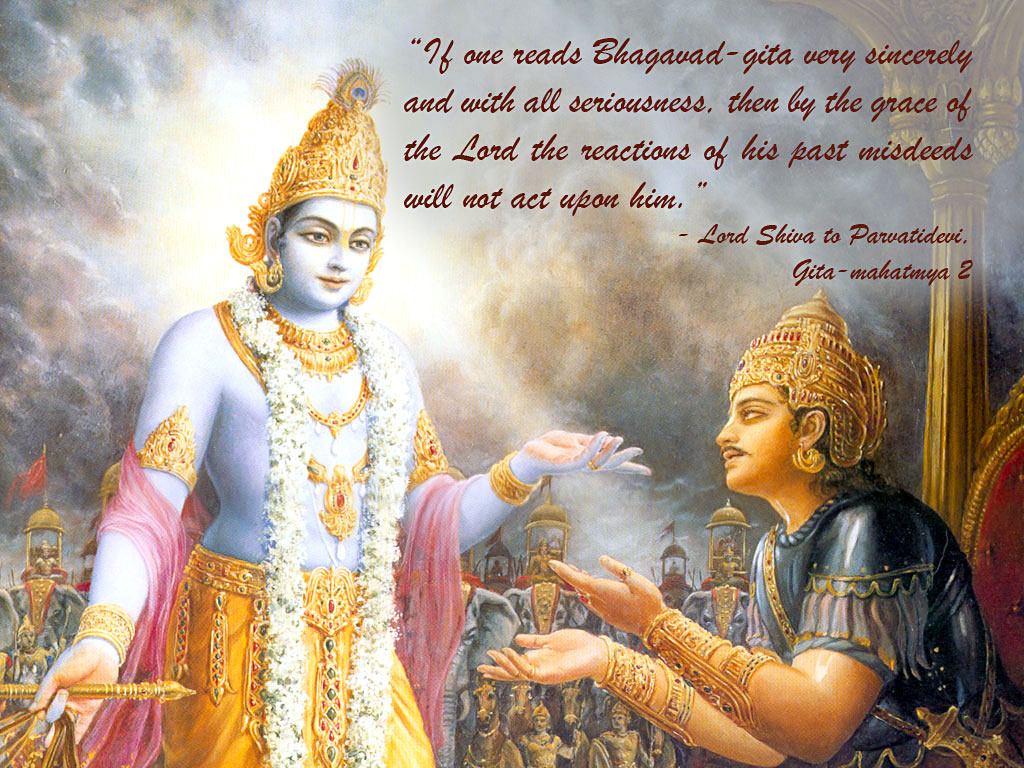|
Who is Almighty - The Bhagavad Gita ॥ श्रीमद्भगवद्गीता ॥ ॥ ॐ श्री परमात्मने नमः ॥ ॥ अथ श्रीमद्भगवद्गीता ॥ Shree Krishna has explained about the almighty or Brahman (in Sanskrit, root bṛh means "to swell, expand, grow, enlarge") in chapters 7, 11, 13, 15 and 17 of Shrimad Bhagavad Gita. Brahman Supreme Brahman has two concepts viz. Nirguna and Saguna. Nirguna Brahman is formless, without attributes or quality. Saguna Brahman, in contrast, was envisioned and developed as with form, attributes and quality. Brahman is distinct from Brahma (one of the deities & mortal), Brahmin (one of the Verna) and Brahmama (one of the four ancient layers of texts within the Vedas). Supreme Brahman, the truth (Being)-consciousness-Bliss, is eternal, the ultimate reality and pervading all in the universe. Brahman is omnipresent, transcendent (supreme, divine), beyond time and space, but yet immanent in nature and in all beings – as light in the sun and other luminaries, as gravitation that keeps the galaxies in position, as fertility in soil, as digestive powers in all living beings and above all in the hearts of all as the living spirit from whom life, memory, intelligence, knowledge and everything else proceed. Supreme Brahman is the lord of the two beginning less entities Prakriti and Jiva is said to be neither Sat (being) nor Asat (non-being). Brahman is the the sustainer of beings (as Vishnu), the destroyer (as Rudra) and the creator of all (as Brahma). Brahman is knowledge itself, worth knowing, and worth attaining through real wisdom. The eternal Jivatma (soul) the fragment of the Supreme Being is the controller of the body etc. Around Jivatma is the mind, ego, Buddhi, senses etc. which are arisen from Prakriti. That is infinite, this is infinite. From the infinite, the Infinite has come forth. When the Infinite is subtracted from the Infinite, the Infinite remain. Om tat sat are the holy syllables & represent Brahman, and indicate the sacrificial mentality. Om is sound Brahman (शब्द) and the seed of all mantras, Tat means that indicating Brahman. Sat means truth or reality, is equally representing Brahman. Utterance of these syllables, promotes his spiritual evolution. Brahman is the goal and devotion, real wisdom, selfless karma & dhayan yoga are the paths. Shree Krishna has explained the attributes of Brahman & Jivatma as under (in bracket, chapter. verse) (the relevant Sanskrit verses of Bhagavad Gita are mentioned at the bottom): Chapter: 7 - Attributes of Almighty - I
Chapter: 11 - Almighty
Chapter: 13 - Attributes of Almighty - II
Chapter: 15 - Attributes of Almighty - III
Chapter: 17 - Om Tat Sat
Chapter: 15 - Jivatma
Reference:
रसोऽहमप्सु कौन्तेय प्रभास्मि शशिसूर्ययोः । प्रणवः सर्ववेदेषु शब्दः खे पौरुषं नृषु ॥ ७-८॥ पुण्यो गन्धः पृथिव्यां च तेजश्चास्मि विभावसौ । जीवनं सर्वभूतेषु तपश्चास्मि तपस्विषु ॥ ७-९॥ बीजं मां सर्वभूतानां विद्धि पार्थ सनातनम् । बुद्धिर्बुद्धिमतामस्मि तेजस्तेजस्विनामहम् ॥ ७-१०॥ बलं बलवतां चाहं कामरागविवर्जितम् । धर्माविरुद्धो भूतेषु कामोऽस्मि भरतर्षभ ॥ ७-११॥ ये चैव सात्त्विका भावा राजसास्तामसाश्च ये । मत्त एवेति तान्विद्धि न त्वहं तेषु ते मयि ॥ ७-१२॥ Chapter: 11 (कालोऽस्मि लोकक्षयकृत्प्रवृद्धो लोकान्समाहर्तुमिह प्रवृत्तः । ऋतेऽपि त्वां न भविष्यन्ति सर्वे येऽवस्थिताः प्रत्यनीकेषु योधाः ॥ ११-३२॥ कस्माच्च ते न नमेरन्महात्मन् गरीयसे ब्रह्मणोऽप्यादिकर्त्रे । अनन्त देवेश जगन्निवास त्वमक्षरं सदसत्तत्परं यत् ॥ ११-३७॥ त्वमादिदेवः पुरुषः पुराणस्-त्वमस्य विश्वस्य परं निधानम् । वेत्तासि वेद्यं च परं च धाम त्वया ततं विश्वमनन्तरूप ॥ ११-३८॥ वायुर्यमोऽग्निर्वरुणः शशाङ्कः प्रजापतिस्त्वं प्रपितामहश्च । नमो नमस्तेऽस्तु सहस्रकृत्वः पुनश्च भूयोऽपि नमो नमस्ते ॥ ११-३९॥ Chapter: 13 ज्ञेयं यत्तत्प्रवक्ष्यामि यज्ज्ञात्वामृतमश्नुते । अनादिमत्परं ब्रह्म न सत्तन्नासदुच्यते ॥ १३-१२॥ सर्वतः पाणिपादं तत्सर्वतोऽक्षिशिरोमुखम् । सर्वतः श्रुतिमल्लोके सर्वमावृत्य तिष्ठति ॥ १३-१३॥ सर्वेन्द्रियगुणाभासं सर्वेन्द्रियविवर्जितम् । असक्तं सर्वभृच्चैव निर्गुणं गुणभोक्तृ च ॥ १३-१४॥ बहिरन्तश्च भूतानामचरं चरमेव च । सूक्ष्मत्वात्तदविज्ञेयं दूरस्थं चान्तिके च तत् ॥ १३-१५॥ अविभक्तं च भूतेषु विभक्तमिव च स्थितम् । भूतभर्तृ च तज्ज्ञेयं ग्रसिष्णु प्रभविष्णु च ॥ १३-१६॥ ज्योतिषामपि तज्ज्योतिस्तमसः परमुच्यते । ज्ञानं ज्ञेयं ज्ञानगम्यं हृदि सर्वस्य विष्ठितम् ॥ १३-१७॥ Chapter: 15 यदादित्यगतं तेजो जगद्भासयतेऽखिलम् । यच्चन्द्रमसि यच्चाग्नौ तत्तेजो विद्धि मामकम् ॥ १५-१२॥ गामाविश्य च भूतानि धारयाम्यहमोजसा । पुष्णामि चौषधीः सर्वाः सोमो भूत्वा रसात्मकः ॥ १५-१३॥ अहं वैश्वानरो भूत्वा प्राणिनां देहमाश्रितः । प्राणापानसमायुक्तः पचाम्यन्नं चतुर्विधम् ॥ १५-१४॥ सर्वस्य चाहं हृदि सन्निविष्टो मत्तः स्मृतिर्ज्ञानमपोहनञ्च । वेदैश्च सर्वैरहमेव वेद्यो वेदान्तकृद्वेदविदेव चाहम् ॥ १५-१५॥ द्वाविमौ पुरुषौ लोके क्षरश्चाक्षर एव च । क्षरः सर्वाणि भूतानि कूटस्थोऽक्षर उच्यते ॥ १५-१६॥ उत्तमः पुरुषस्त्वन्यः परमात्मेत्युदाहृतः । यो लोकत्रयमाविश्य बिभर्त्यव्यय ईश्वरः ॥ १५-१७॥ यस्मात्क्षरमतीतोऽहमक्षरादपि चोत्तमः । अतोऽस्मि लोके वेदे च प्रथितः पुरुषोत्तमः ॥ १५-१८॥ यो मामेवमसम्मूढो जानाति पुरुषोत्तमम् । स सर्वविद्भजति मां सर्वभावेन भारत ॥ १५-१९॥ Chapter: 17 ॐतत्सदिति निर्देशो ब्रह्मणस्त्रिविधः स्मृतः । ब्राह्मणास्तेन वेदाश्च यज्ञाश्च विहिताः पुरा ॥ १७-२३॥ तस्मादोमित्युदाहृत्य यज्ञदानतपःक्रियाः । प्रवर्तन्ते विधानोक्ताः सततं ब्रह्मवादिनाम् ॥ १७-२४॥ तदित्यनभिसन्धाय फलं यज्ञतपःक्रियाः । दानक्रियाश्च विविधाः क्रियन्ते मोक्षकाङ्क्षिभिः ॥ १७-२५॥ सद्भावे साधुभावे च सदित्येतत्प्रयुज्यते । प्रशस्ते कर्मणि तथा सच्छब्दः पार्थ युज्यते ॥ १७-२६॥ यज्ञे तपसि दाने च स्थितिः सदिति चोच्यते । कर्म चैव तदर्थीयं सदित्येवाभिधीयते ॥ १७-२७॥ अश्रद्धया हुतं दत्तं तपस्तप्तं कृतं च यत् । असदित्युच्यते पार्थ न च तत्प्रेत्य नो इह ॥ १७-२८॥ Jivatma – Chapter: 15 ममैवांशो जीवलोके जीवभूतः सनातनः । मनःषष्ठानीन्द्रियाणि प्रकृतिस्थानि कर्षति ॥ १५-७॥ शरीरं यदवाप्नोति यच्चाप्युत्क्रामतीश्वरः । गृहीत्वैतानि संयाति वायुर्गन्धानिवाशयात् ॥ १५-८॥ श्रोत्रं चक्षुः स्पर्शनं च रसनं घ्राणमेव च । अधिष्ठाय मनश्चायं विषयानुपसेवते ॥ १५-९॥ यतन्तो योगिनश्चैनं पश्यन्त्यात्मन्यवस्थितम् । यतन्तोऽप्यकृतात्मानो नैनं पश्यन्त्यचेतसः ॥ १५-११॥
0 Comments
Leave a Reply. |

 RSS Feed
RSS Feed